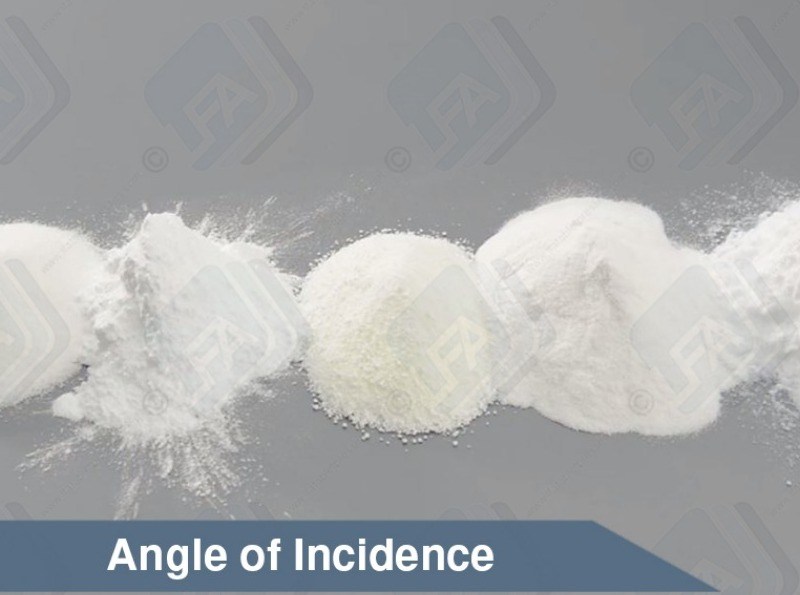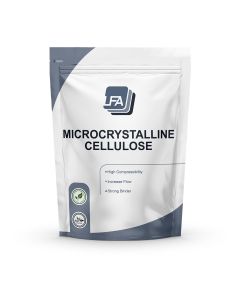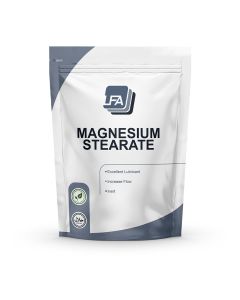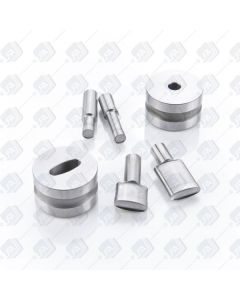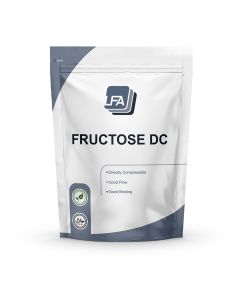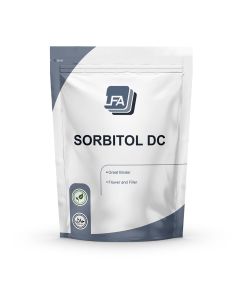Di-Calcium-Phosphat ist eine Zutat in einer Reihe von verschiedenen Produkten. Es wird bei der Herstellung von Tabletten und Kapseln als "flüssigkeitfördernder Bestandteil" verwendet. Di-Calcium-Phosphat kommt in verschiedenen Maschenweiten. Die gröberen Sorten die hier angeboten werden fließen gut und haben eine ausgezeichnete Kompressibilität.
Fließfähigkeit ist ein wesentliches Element des Herstellungsprozesses. Es sorgt dafür, dass Ihre Zutaten mit Leichtigkeit durch die Maschinerie fließen. Darüber hinaus bedeutet dies, dass Ihre Endprodukte im gesamten konsistente Bestandteile haben werden. Dadurch wird sichergestellt, dass jede Tablette gleiche sein wird.
Kompressibilität ist die Leichtigkeit, mit der eine Pulver eine solide Tablette bildet. LFA´s Di-Calcium-Phosphat ist direkt komprimierbar. Verwendung von Hilfsstoffen wie Di-Calcium-Phosphat reduziert den Aufwand um neue Formeln zu erstellen.
Di-Calcium-Phosphat ist in Zitronensäure und Ammonium Citrat sehr löslich. Es hat einen PH Wert von 6,5 to 7. Aufgrund seiner Alkalität wird es mit einigen sauren Wirkstoffen nicht arbeiten. Di-Calcium-Phosphat besitzt moderate Bindungseigenschaften. Es benötigt anderen Hilfsstoffen.
Di-Calcium-Phosphat passiert leicht das Verdauungssystem. Es hat viele verschiedene Verwendungen und ist für sich selbst ein Nahrungsergänzungsmittel. Es wird häufig in Frühstückszerealien, Mehl und Nudel-Produkte integriert. Es wird als Antiklumpmittel verwendet, da es geringe Mengen an Feuchtigkeit aufnehmen kann. Es ist auch eine Phosphor Mineralquellen, die oft in Bio Kost verwendet wird. Eine weitere prominente Verwendung für Di-Calcium-Phosphat ist in Tierfutter. Es trägt zum tierischen Stoffwechsel bei und beschleunigt Wachstum und Entwicklung.
Der richtige Umgang mit Di-Calcium-Phosphat ist wichtig für die Sicherheit und die Qualität des Produkts. Dieses Produkt kann die Augen reizen und bei Inhalation leichte Brust Beschwerden verursachen. Beim Umgang mit Di-Calcium-Phosphat sollten Sie eine Inhalationsmaske, Schutzbrille und Handschuhe verwenden. Bewahren Sie Di-Calcium-Phosphat in einem verschlossenen Behälter bei moderaten Temperaturen auf. Vermeiden Sie Feuchtigkeit und extremen Temperaturen. Falsche Lagerung kann im Laufe der Zeit die Härte der Tablette beeinflussen.
Di-Calcium-Phosphat ist ein wirksames Fließmittel, das Ihrer Formel auch Nährstoffe hinzu fügt. Es kann vielen Lebensmitteln als Ergänzung hinzugefügt werden und trägt bei Menschen und Tiere zum Wohlbefinden bei. Phosphor und Kalzium in der Ernährung, verbessert in vielerlei Hinsicht die Körperfunktionen. Dies ist ein Produkt, welches die Verbraucher kennen und ist die perfekte Ergänzung für Ihr Tabletten.
LFA Di-Calcium-Phosphat kommt als kristallines Pulver. Es ist weiß oder fast weiß, geruchlos und frei fließend.
Schreiben Sie eine Bewertung
Are all excipients safe for all ages to consume?
Yes, it does not matter what age, size or sex the person consuming the products is. It is, however, important to check the intolerance data.
Are all the excipients safe for human consumption?
Yes, all of the excipients are safe for human or animal consumption. There are some precautions that should be taken when handling them and there are some people that might have intolerances to some of them. Information on this can be found in the products MSDS and Intolerance Data Sheet. This can be found in this section for every excipient.
Are there any known allergens or health risks?
Sind Ihre sonstigen Bestandteile natürlicher?
Ja, alle unsere sonstigen Bestandteile sind, gewonnen aus natürlichen Quellen. Für weitere Informationen besuchen Sie bitte die einzelnen Produktseiten.
Can I get a better price for excipients than is listed on the website?
Yes, we have bulk pricing for all of our excipients, and these can be found in this section. We offer bulk in 500 kg, 1 ton, 2 ton and 5 ton lots. The prices are set on these quantities as these are the amounts that will fit on pallets.
Can I have a CoA for my Excipient?
Yes. CoA stands for Certificate of Analysis this is also known some times as an MSDS (Material Safety Data Sheet) all of the information contained in a CoA is inside the MSDS for every LFA product which is emailed to you after purchase.
Kann ich produzieren Tabletten ohne Hilfsstoffe?
Es ist unwahrscheinlich, dass Sie in der Lage zu produzieren Tabletten ohne Hilfsstoffe überhaupt. Bestimmte Produkte binden, ohne Hilfsstoffe, aber dann nicht fließen durch die Maschine. Wir empfehlen, dass Sie eine
Dissolving rate? Any known factors that can affect the rate, speed up or slow down the breakdown of a tablet?
Yes. There are two things at play here. You can get hygroscopic and hydrophobic excipients. Hygroscopic means that they take on water quickly, while hydrophobic means that they repel water.
There are products know as supper disintegrants. These products help the breakdown of tablets. At the moment LFA does not sell any supper disintegrants.
Magnesium stearate is hydrophobic this means that it will slow the breakdown of a tablet.
However, it is used in such small amounts that most of the time it will not make a difference to our customer's products. If they would like to be sure then they should conduct what is known as a disintegration test.
Do any of the excipients increase the speed of damage to tooling? i.e. more granular?
Yes, Dicalcium Phosphate, if used in high amounts, will cause more damage to tooling than just Firmapress or MCC. However, there are not many situations in which this would be a good idea.
How long is the storage period of each excipient? What is the shelf life?
Firmapress - 2 years form batch date.
Dextrose - 3 years from batch date.
Dicalcium Phosphate - 3 years from batch date.
Microcrystalline Cellulose -
Magnesium stearate -
Lactose - 2 years from batch date.
Silica Dioxide - 2 years from batch date.
How should I clean contact parts that have come into contact with my excipients or active ingredients?
here are 6 steps that should be followed as a general rule of thumb when cleaning contact surfaces that have come into contact with powders:
Dry Clean - First you need to remove as much of the dry powder as possible. You can do this using a hover/vacuum. Make sure that the vacuum you are using has a filter good enough to handle fine dust.
Wet Clean - Next you need to perform a wet clean. This can be done with warm water and soap or if available an ultrasonic cleaner.
Rinse - Next you need to rinse off any soap with potable water (drinking water). You do not have to do this if you used an ultrasonic cleaner in the last step. It is important to ensure that all parts are thoroughly dried immediately after washing to avoid any rusting.
Sanitise - Next you need to sanitise the surface. This step is recommended by the FDA. There are a number of sanitising solutions available designed to be applied and left on.
Lubricate - You now need to lubricate any parts that require it. This should be with the appropriate grade oil or grease considering your use and greasing chart. Store - Finally store any of the parts in a cool dry place. If you are storing them on the machine then make sure the machine is in a temperature controlled environment with low humidity.
Was ist der Unterschied zwischen der Bereich der sonstigen Bestandteile?
Was ist der Unterschied zwischen der Bereich der sonstigen Bestandteile?
Wir bieten Mikrokristalline Cellulose, Magnesiumstearat, Dicalciumphosphat und Firmapress in unserem Bereich der sonstigen Bestandteile.
Mikrokristalline Cellulose ist ein Bindemittel, das hält den Inhalt der tablet zusammen.
Dicalcium-Phosphat ist ein fließender agent und hilft bewegen Zutaten durch die Maschine, bevor Sie komprimiert sind.
Magnesiumstearat ist ein trocken-Schmiermittel und hilft wieder mit der Bewegung der Inhaltsstoffe durch die Maschine, sondern hilft auch bei der Auswurf der Tabletten aus der Maschine. Bitte beachten Sie, dass Magnesium Sterate nicht binden von selbst.
Firmapress ist eine all-in einer Mischung aus Mikrokristalliner Zellulose, Magnesiumstearat und Dicalciumphosphat.
What is the mesh size of your excipients? etc.
Dextrose - approx 100 mesh
Dicalcium Phosphate - approx 100 mesh
Microcrystoline Cellulose - approx 120-200
Magnesium sterate -
Lactose - 80 mesh
Silica Dioxide -
Firmapress - 100-200 mesh
What kind of agent is each excipient?/ What is the main use of each excipient?
Dextrose - Sweetener, binding agent, good for chewable tablets or candy.
Microcrystalline Cellulose - Binder, filling agent. Good at binding tablets and making them bigger. It can also be used as a filler for capsules.
Magnesium stearate - Dry Lubricant. This stops products from getting stuck to the tooling. It can also help with powder flow issues and caking issues.
Lactose - Binder, sweetener and bulking agent. It has a large mesh so it flows well but most people do not like it because of the intolerance issues.
Silica Dioxide - Flowing agent. This assist powders in flowing smoothly through the machines. It also helps with cacking issues where powders get stuck to the machine.
What kind of condition should excipients be stored in?
Firmapress - 2 years form batch date.
Dextrose - 3 years from batch date.
Dicalcium Phosphate - 3 years from batch date.
Microcrystalline Cellulose -
Magnesium stearate -
Lactose - 2 years from batch date.
Silica Dioxide - 2 years from batch date.
Which excipient should I add if the product doesn't bind well?
If your product does not bind well then we would recommend using MCC. This can be used in any % the limiting factor is the size of the tablet.
If the amount of MCC you would have to use would be too much or if you do not want to use MCC then you have 3 other options: Ask your supplier for a directly compressible or tabletable grade of your product. Spray dry your product. Wet granulate your product.
Which excipient should I add if the product is sticky?
If your product is sticky then you will need to add a dry lubricant to your mix. For this, we recommend magnesium stearate.
We do not recommend that you add more than 1% to the mix as more than this can cause capping. If your product is still sticky at this point then we would recommend looking into granulation.
Which excipient should I add if the product/API is clumpy?
If your product or API is clumpy then you will need to add an anticaking agent. For this, we recommend silicon dioxide. We only recommend adding a maximum of 2% of this to the mix



